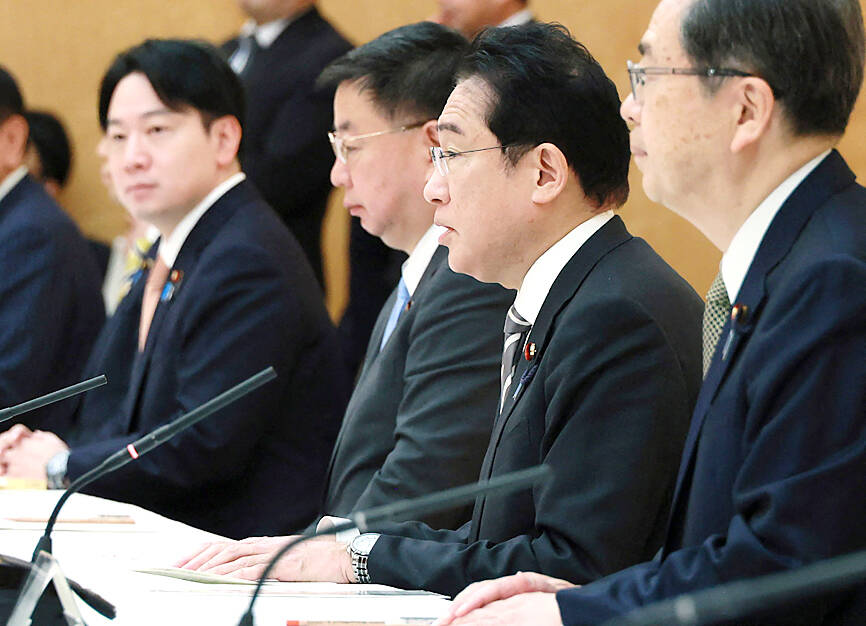The Japanese government yesterday said it has approved a controversial plan to build the country’s first legal casino in Osaka, hoping to draw tourists after years of wrangling.
The local governments of Osaka and Nagasaki in western Japan have long sought approval to build an integrated resort (IR) including casinos, convention centers, hotels, restaurants and entertainment venues.
The Osaka plan, which aims to open the casino by 2029, was approved after “sufficient examination from various perspectives,” Japanese Minister of Land, Infrastructure, Transport and Tourism Tetsuo Saito said.

Photo: AFP
“We expect the IR will become a tourism base that will disseminate the charm of Japan,” he said.
Japan was long the only developed nation that banned casinos, but it in 2016 passed legislation paving the way to make the industry legal.
In 2018, the Japanese legislature enacted a law allowing the construction of integrated resorts.
Critics warn that approving casinos could worsen the country’s already significant gambling problem.
A 2021 government survey found that about 2.2 percent of the population, or 2.8 million people, are affected by gambling addiction.
Many are hooked on pinball-like pachinko slot machines, which together annually generate about ¥14.6 trillion (US$1.1 trillion) in revenue.
About 7,600 pachinko parlors dot the nation, many readily accessible near train stations, using legal loopholes to let winners exchange tokens for cash.
The country also has a multi-trillion-yen market for government-controlled races of horses, motorcycles, boats and bicycles, along with soccer betting and a lottery.
The government says any integrated resort seeking approval would have to submit their plans to prevent gambling addiction.
There is a cap on the number of visits to a facility by Japanese, and family members can request a relative be banned from entering a casino, Saito said.

ENDEAVOR MANTA: The ship is programmed to automatically return to its designated home port and would self-destruct if seized by another party The Endeavor Manta, Taiwan’s first military-specification uncrewed surface vehicle (USV) tailor-made to operate in the Taiwan Strait in a bid to bolster the nation’s asymmetric combat capabilities made its first appearance at Kaohsiung’s Singda Harbor yesterday. Taking inspiration from Ukraine’s navy, which is using USVs to force Russia’s Black Sea fleet to take shelter within its own ports, CSBC Taiwan (台灣國際造船) established a research and development unit on USVs last year, CSBC chairman Huang Cheng-hung (黃正弘) said. With the exception of the satellite guidance system and the outboard motors — which were purchased from foreign companies that were not affiliated with Chinese-funded

PERMIT REVOKED: The influencer at a news conference said the National Immigration Agency was infringing on human rights and persecuting Chinese spouses Chinese influencer “Yaya in Taiwan” (亞亞在台灣) yesterday evening voluntarily left Taiwan, despite saying yesterday morning that she had “no intention” of leaving after her residence permit was revoked over her comments on Taiwan being “unified” with China by military force. The Ministry of the Interior yesterday had said that it could forcibly deport the influencer at midnight, but was considering taking a more flexible approach and beginning procedures this morning. The influencer, whose given name is Liu Zhenya (劉振亞), departed on a 8:45pm flight from Taipei International Airport (Songshan airport) to Fuzhou, China. Liu held a news conference at the airport at 7pm,

Taiwan was ranked the fourth-safest country in the world with a score of 82.9, trailing only Andorra, the United Arab Emirates and Qatar in Numbeo’s Safety Index by Country report. Taiwan’s score improved by 0.1 points compared with last year’s mid-year report, which had Taiwan fourth with a score of 82.8. However, both scores were lower than in last year’s first review, when Taiwan scored 83.3, and are a long way from when Taiwan was named the second-safest country in the world in 2021, scoring 84.8. Taiwan ranked higher than Singapore in ninth with a score of 77.4 and Japan in 10th with

GRIDLOCK: The National Fire Agency’s Special Search and Rescue team is on standby to travel to the countries to help out with the rescue effort A powerful earthquake rocked Myanmar and neighboring Thailand yesterday, killing at least three people in Bangkok and burying dozens when a high-rise building under construction collapsed. Footage shared on social media from Myanmar’s second-largest city showed widespread destruction, raising fears that many were trapped under the rubble or killed. The magnitude 7.7 earthquake, with an epicenter near Mandalay in Myanmar, struck at midday and was followed by a strong magnitude 6.4 aftershock. The extent of death, injury and destruction — especially in Myanmar, which is embroiled in a civil war and where information is tightly controlled at the best of times —